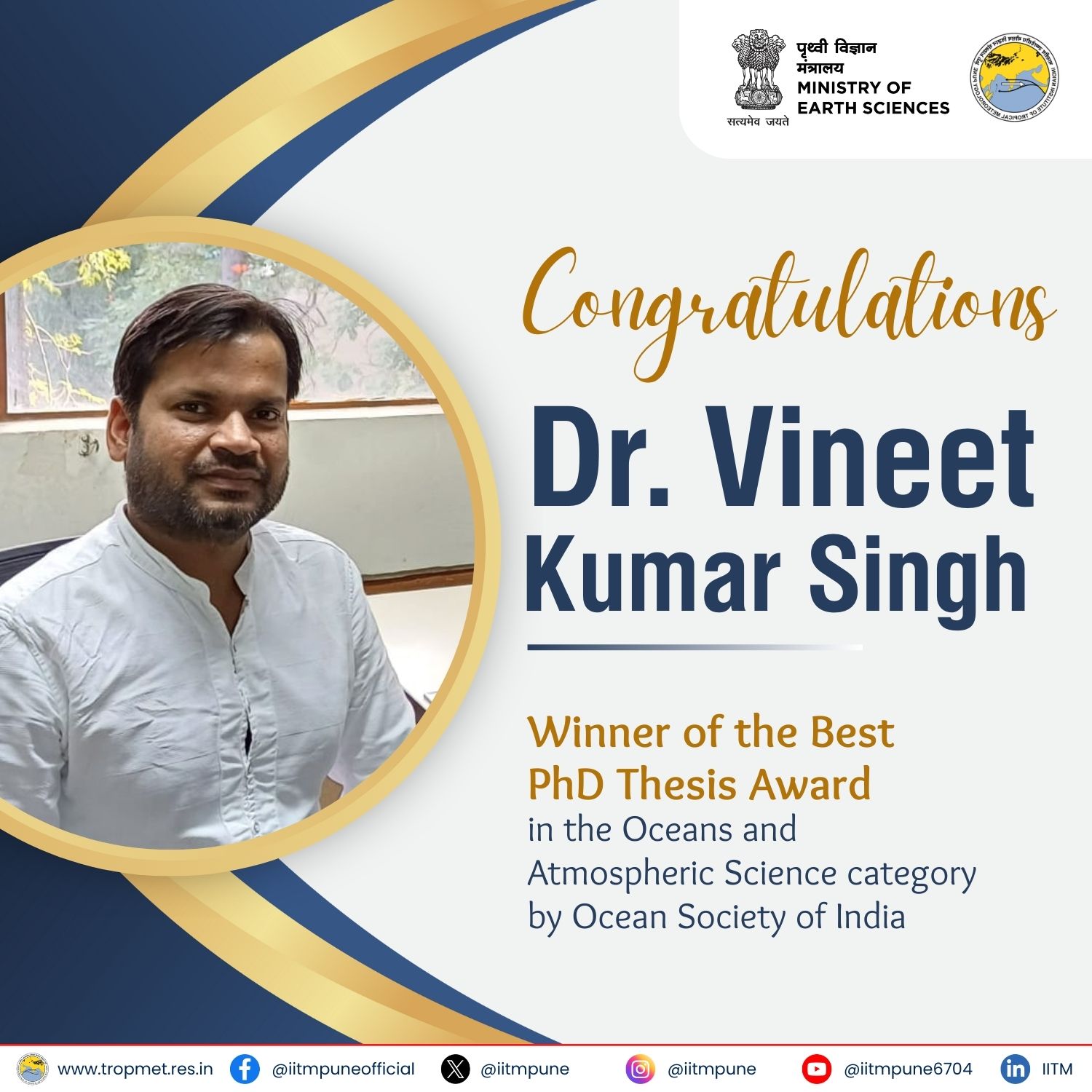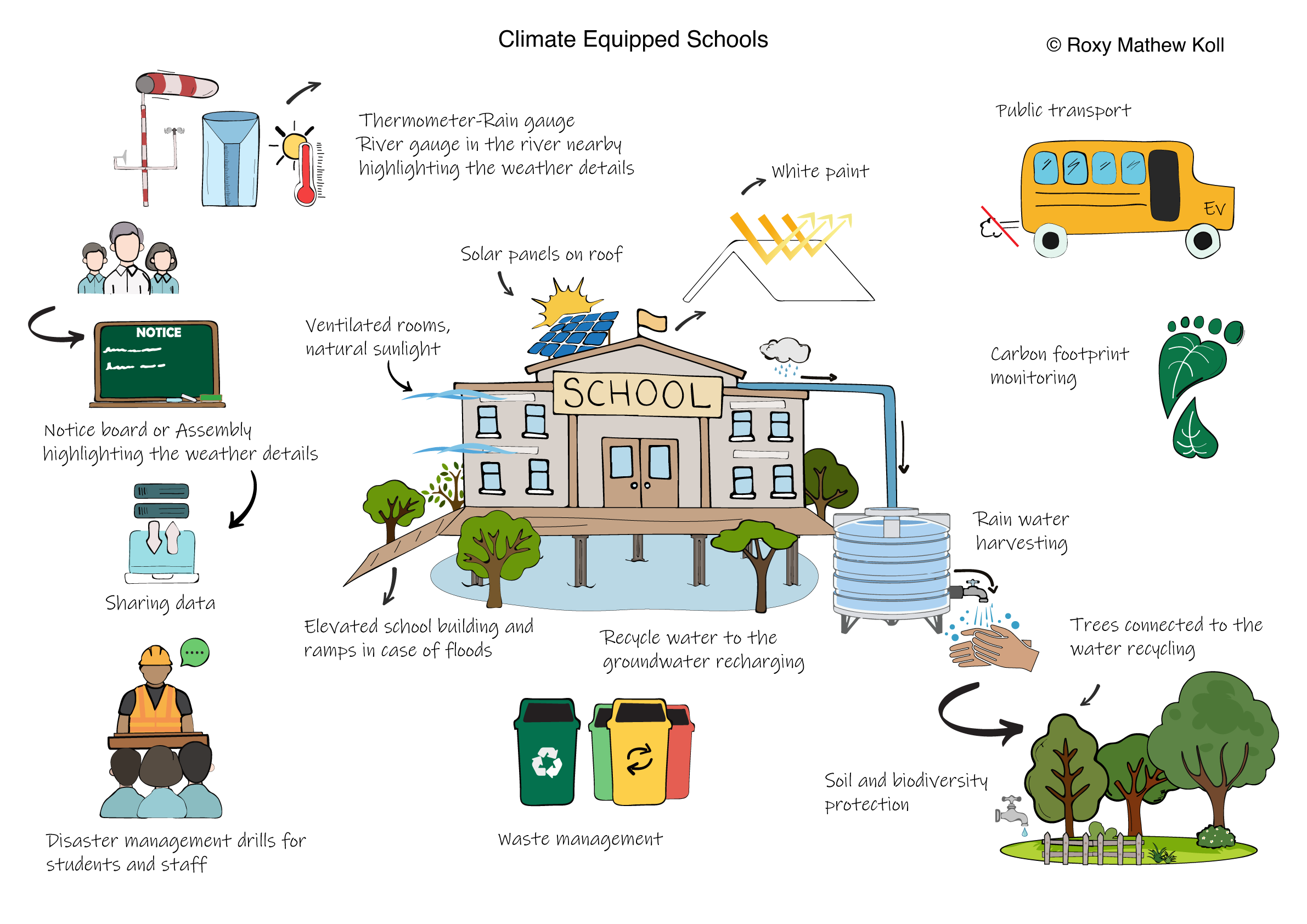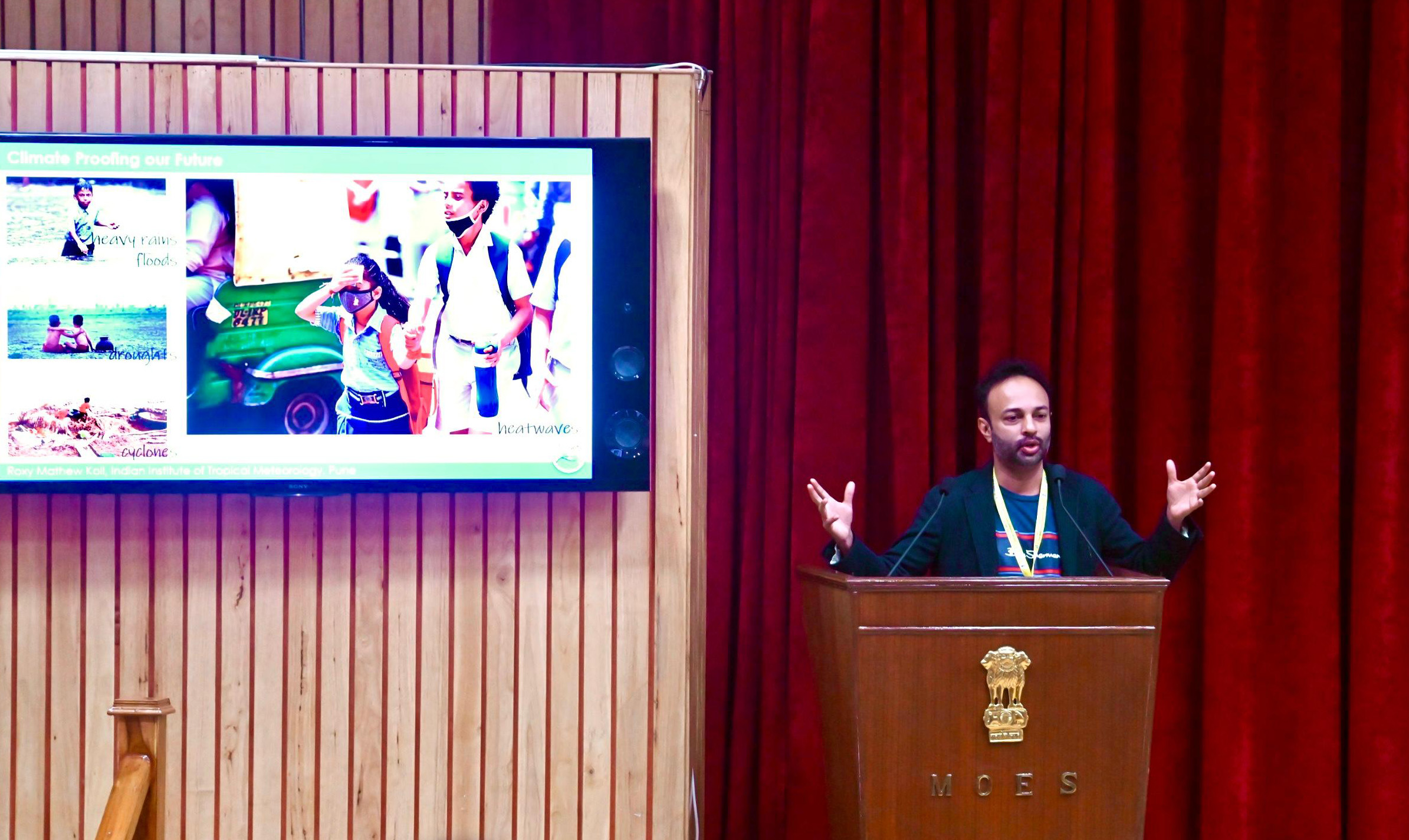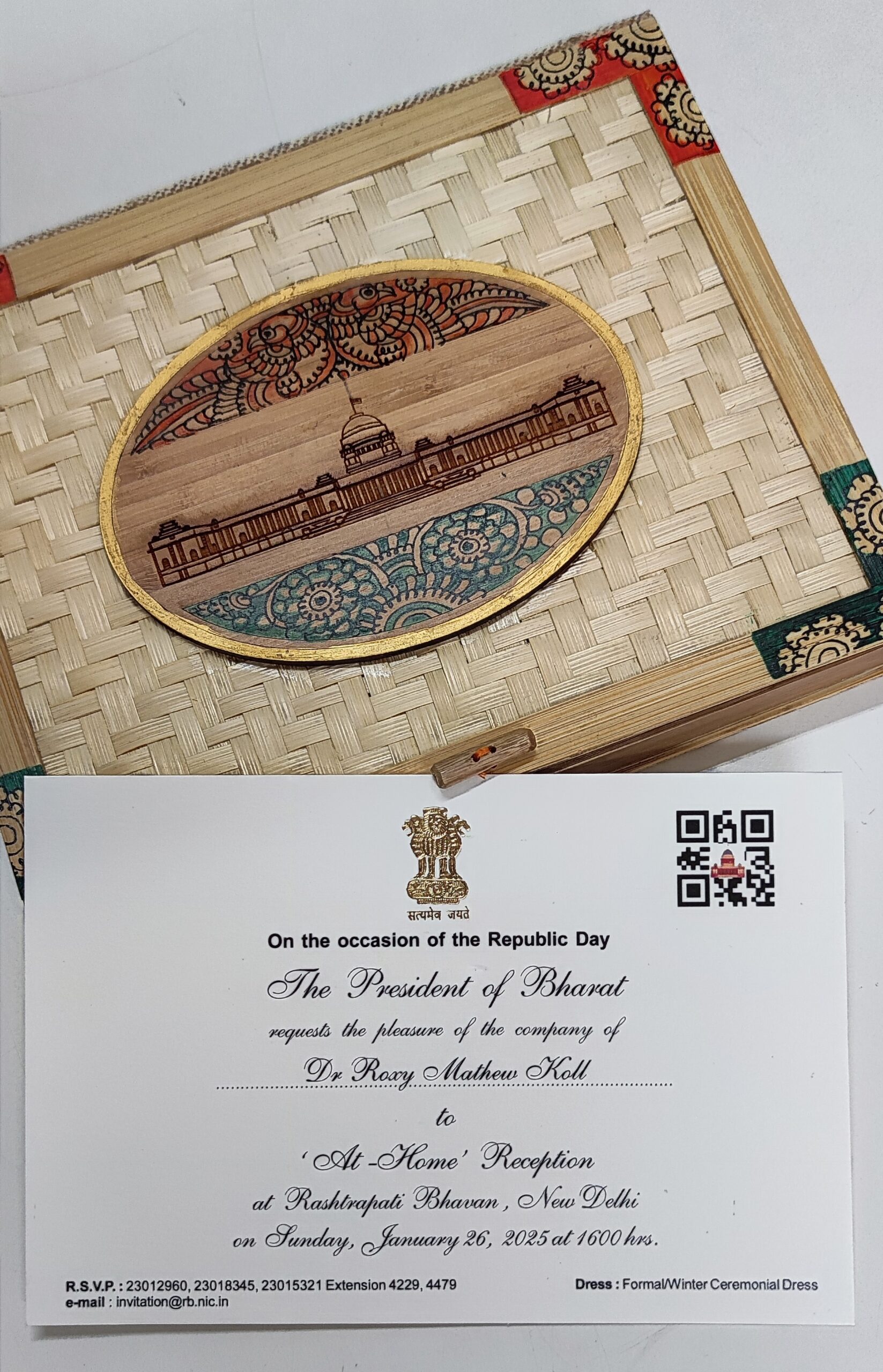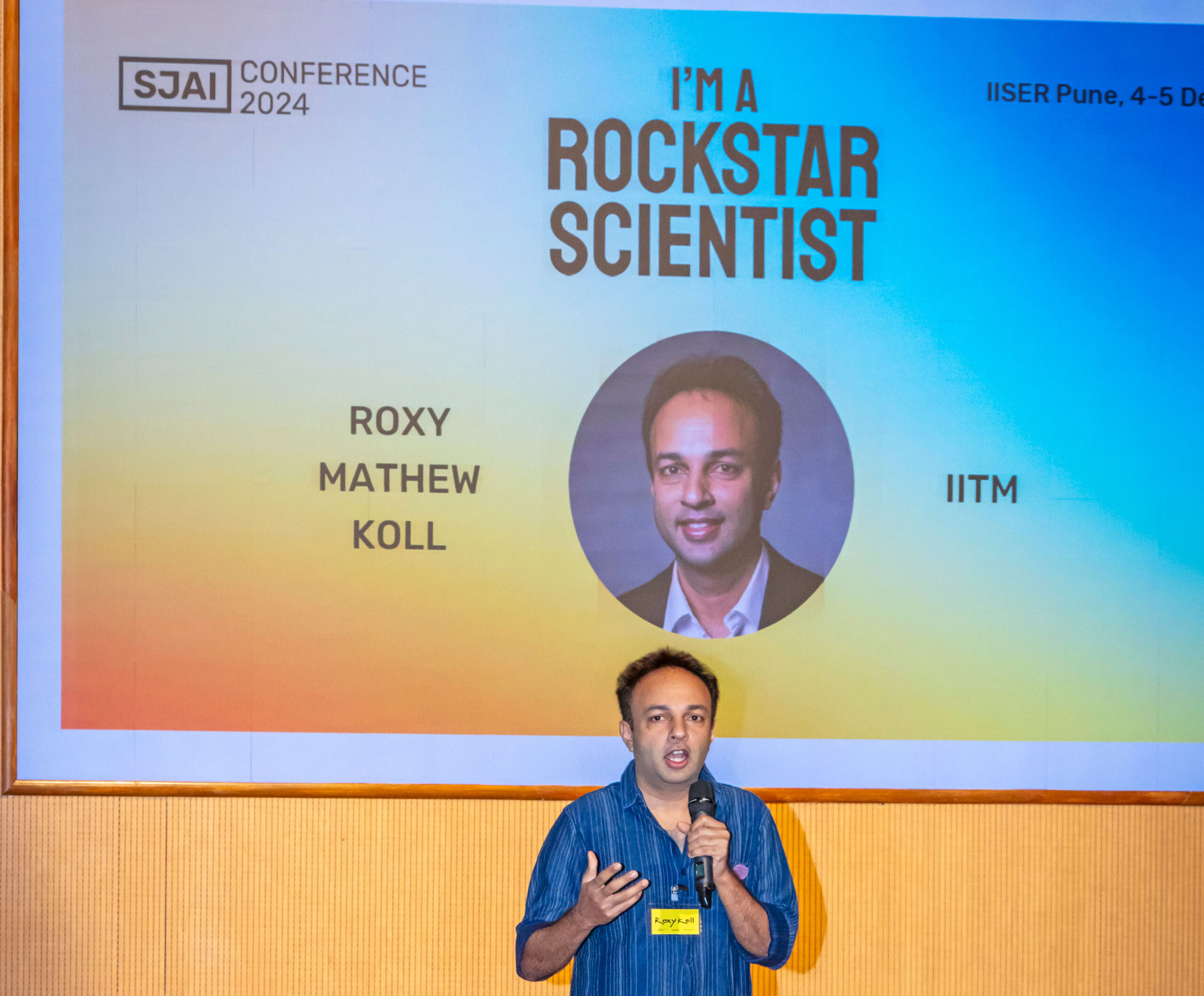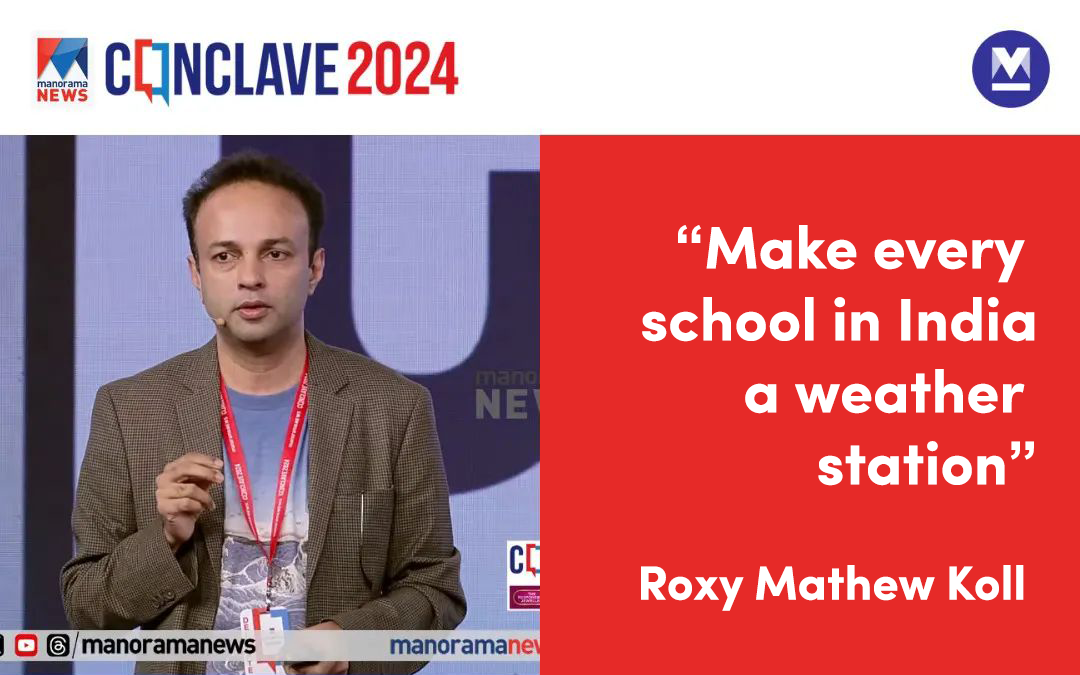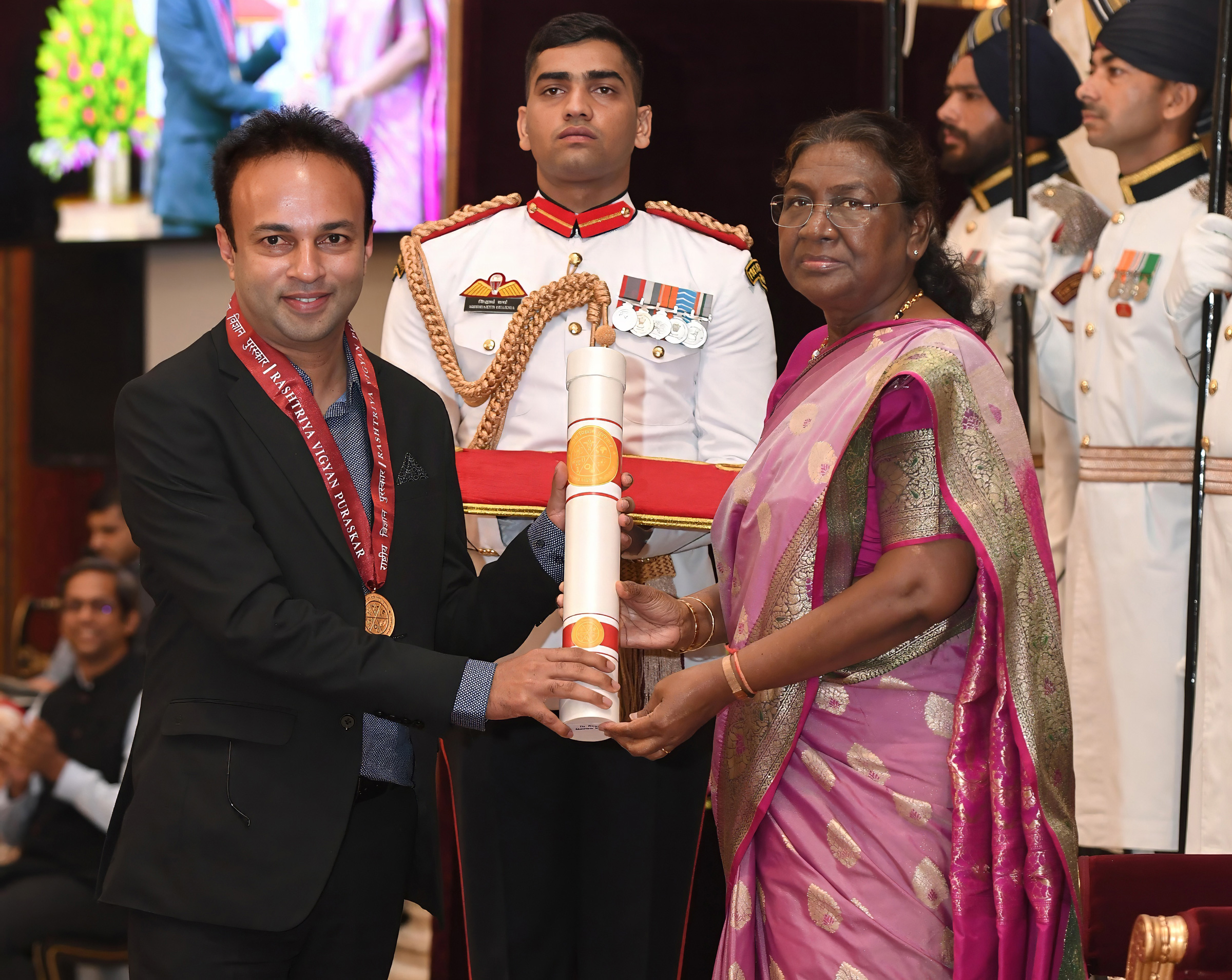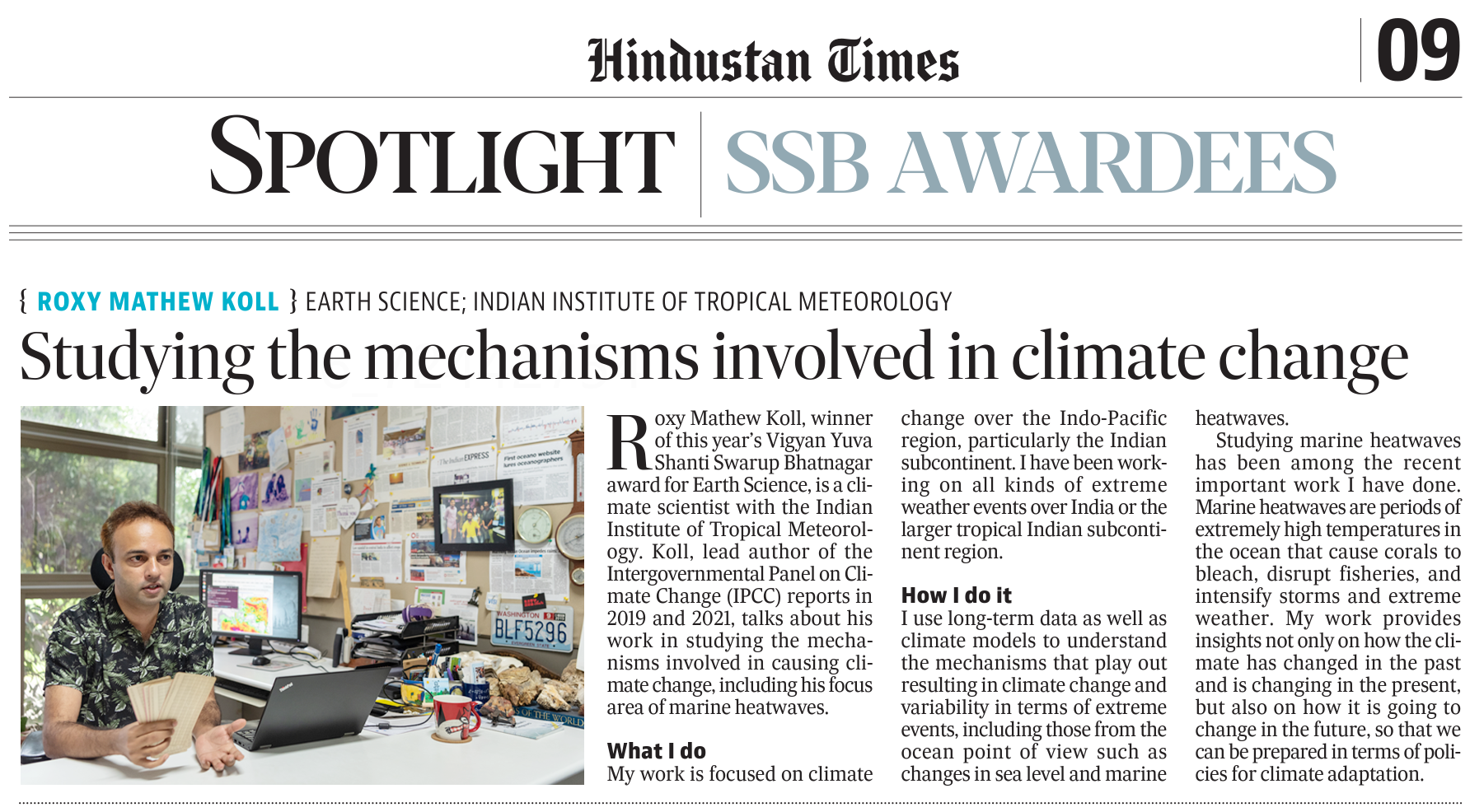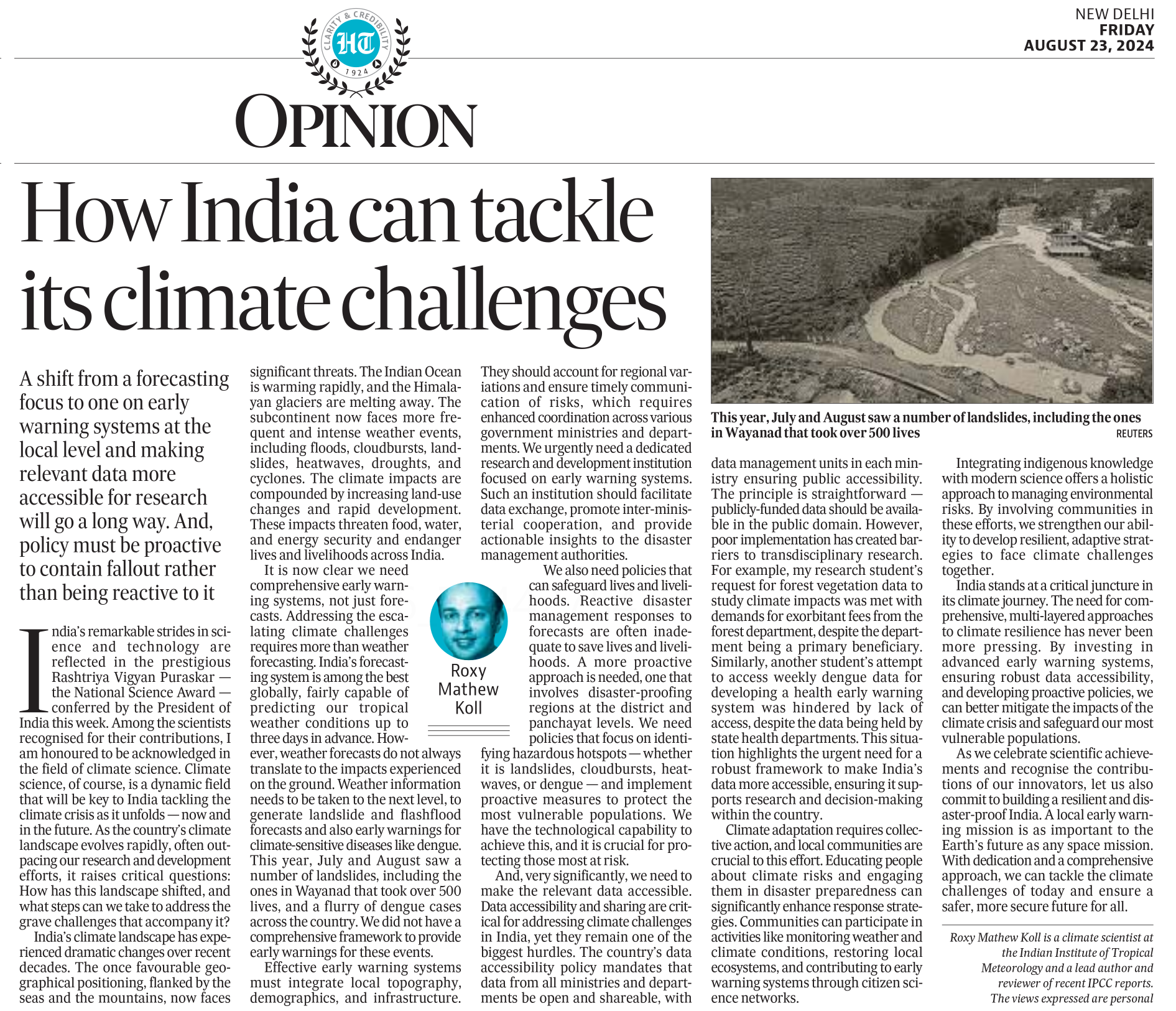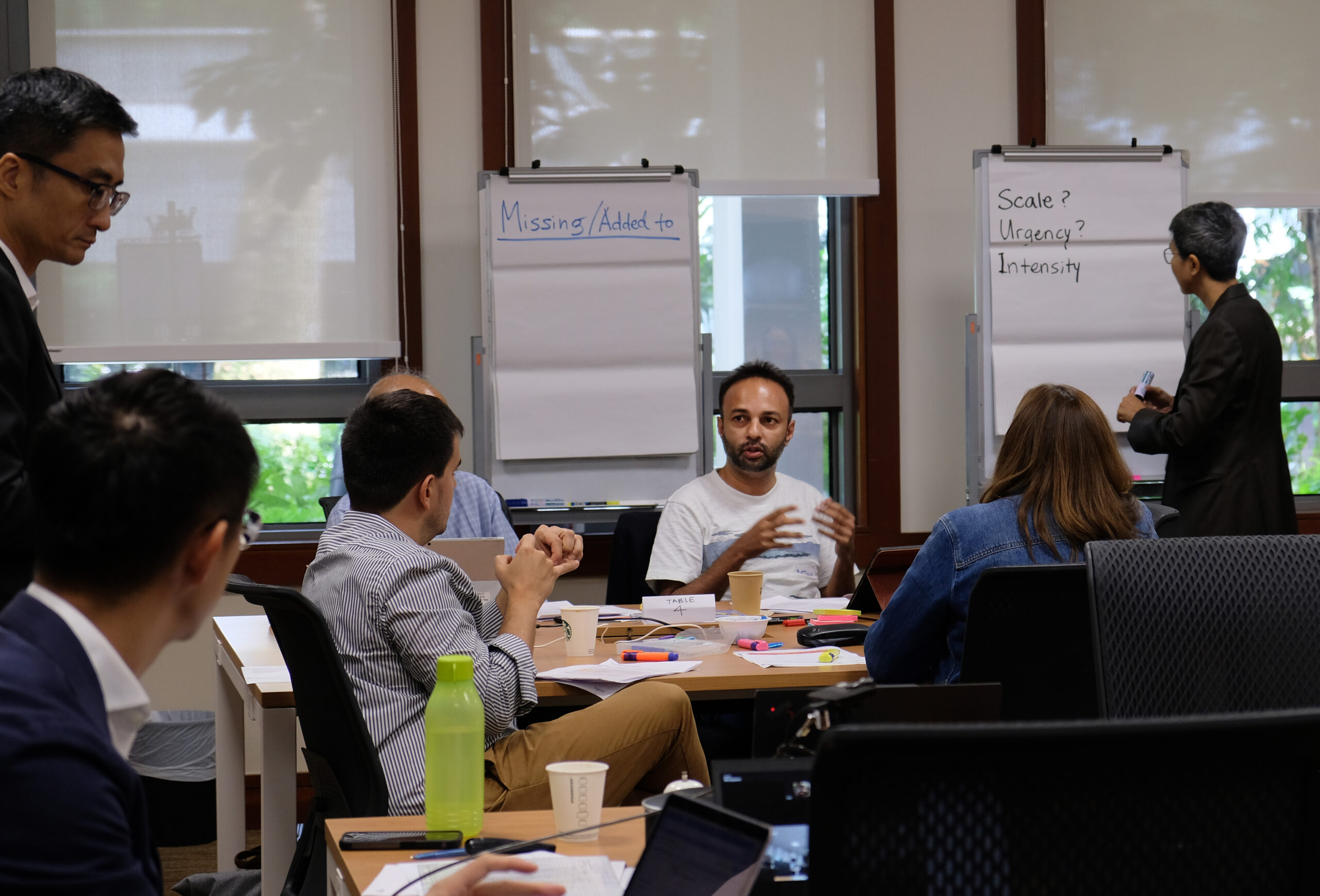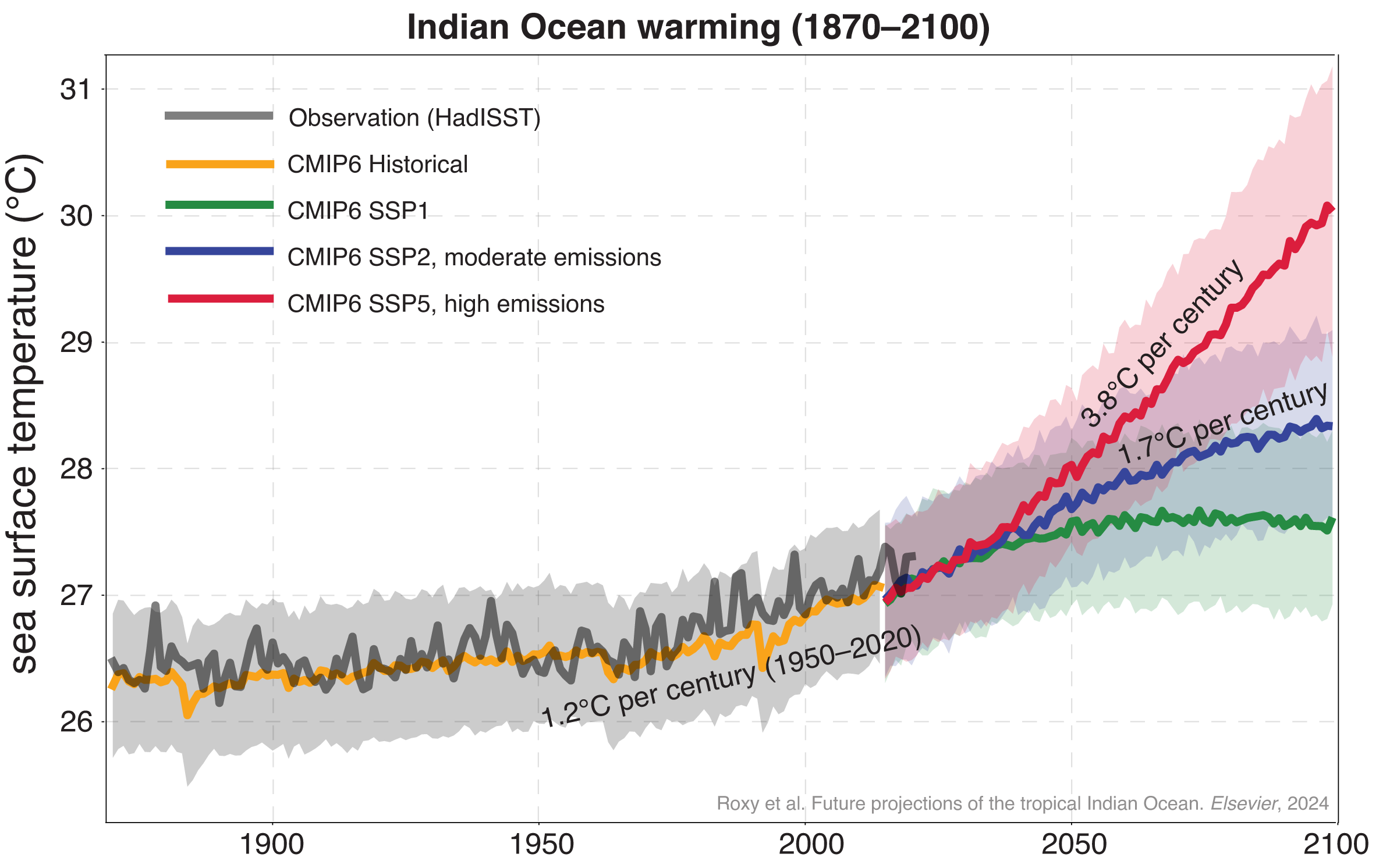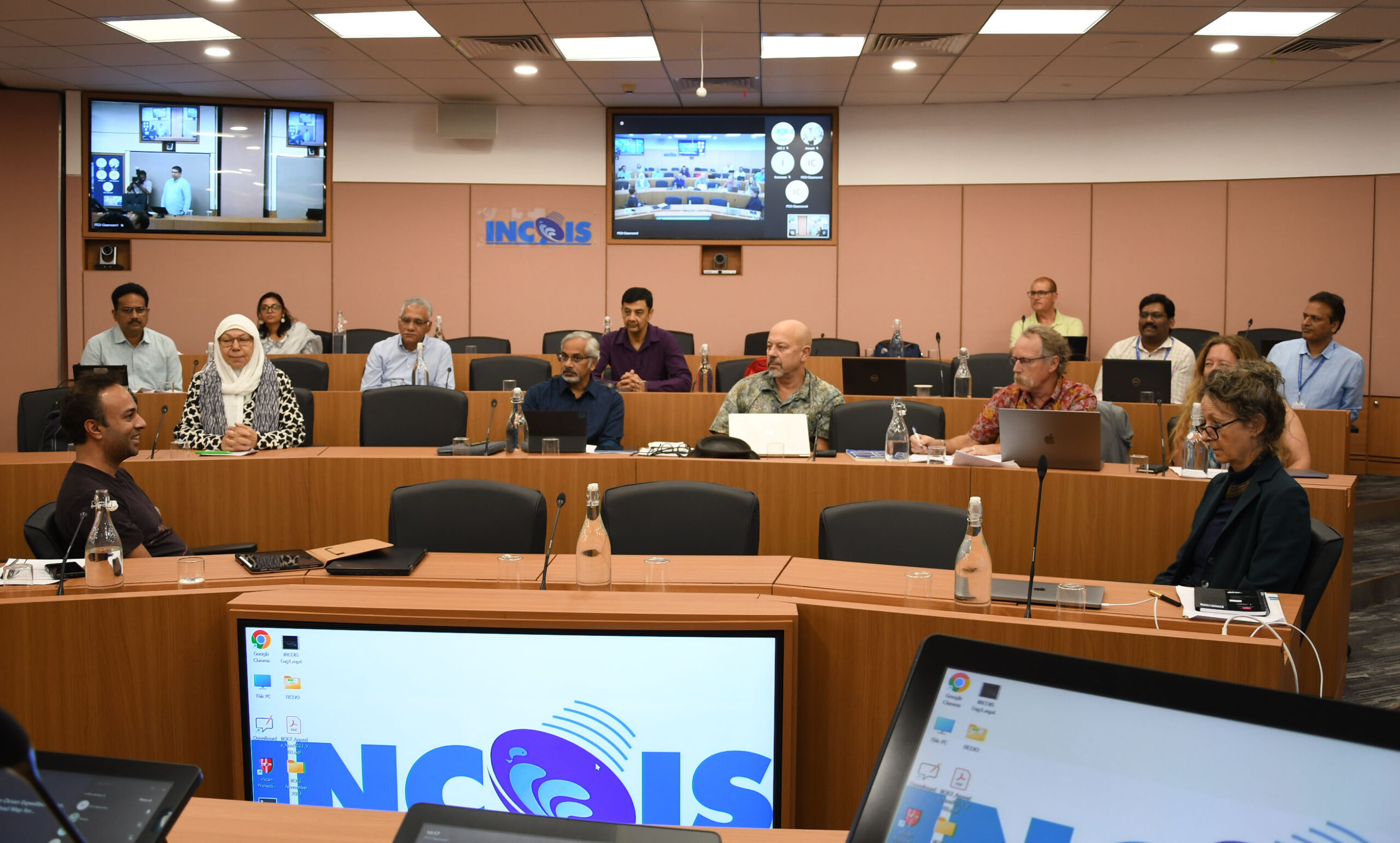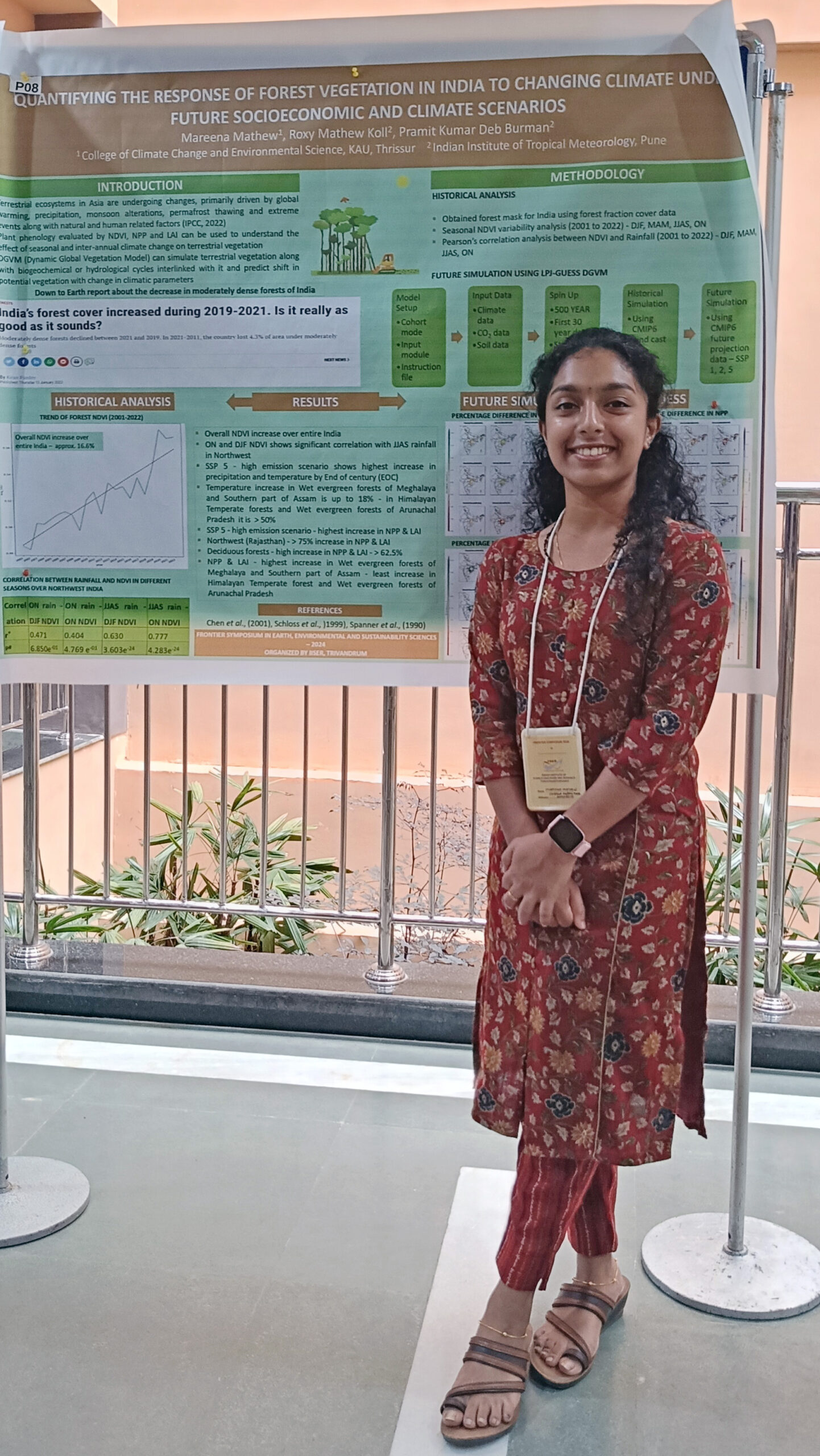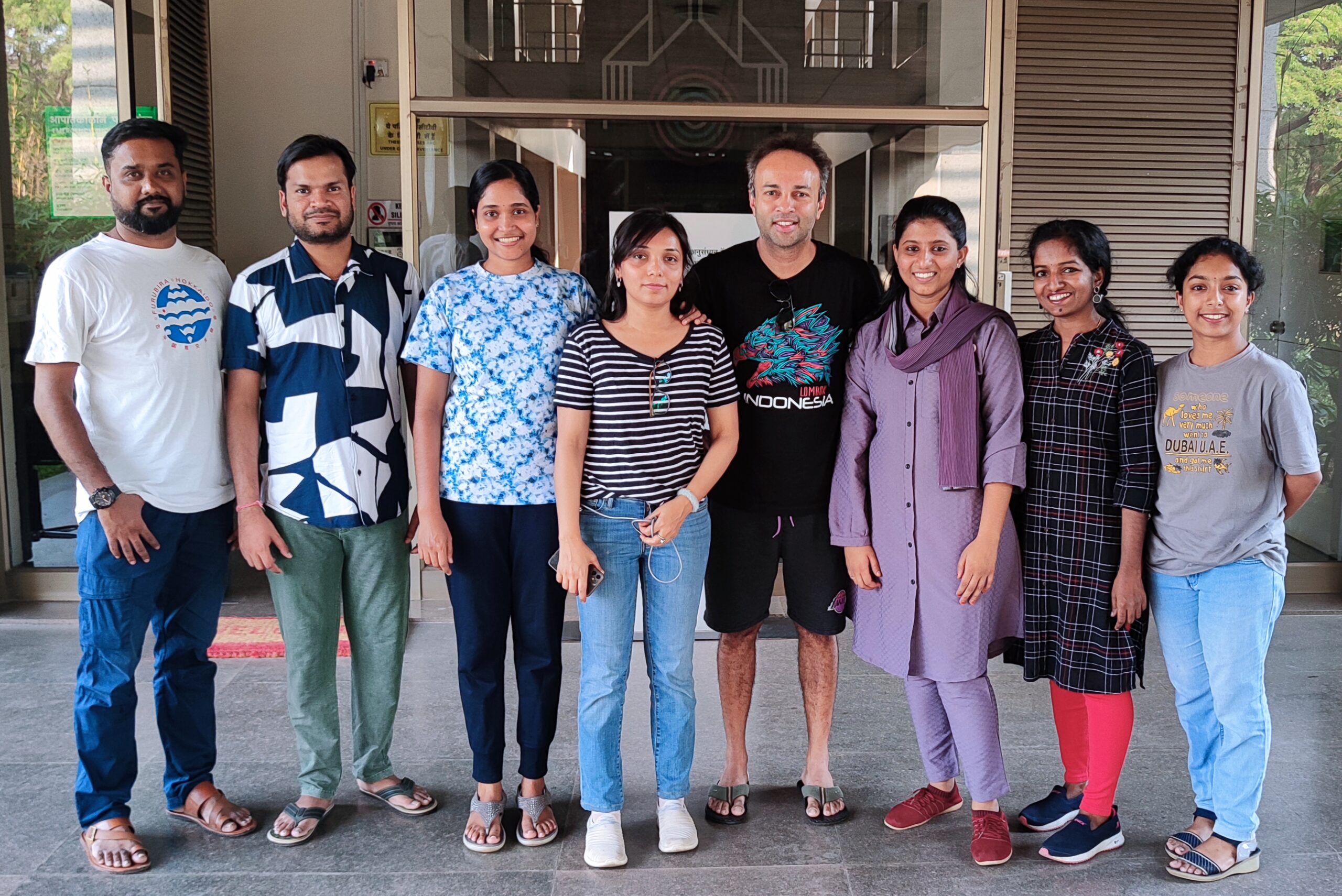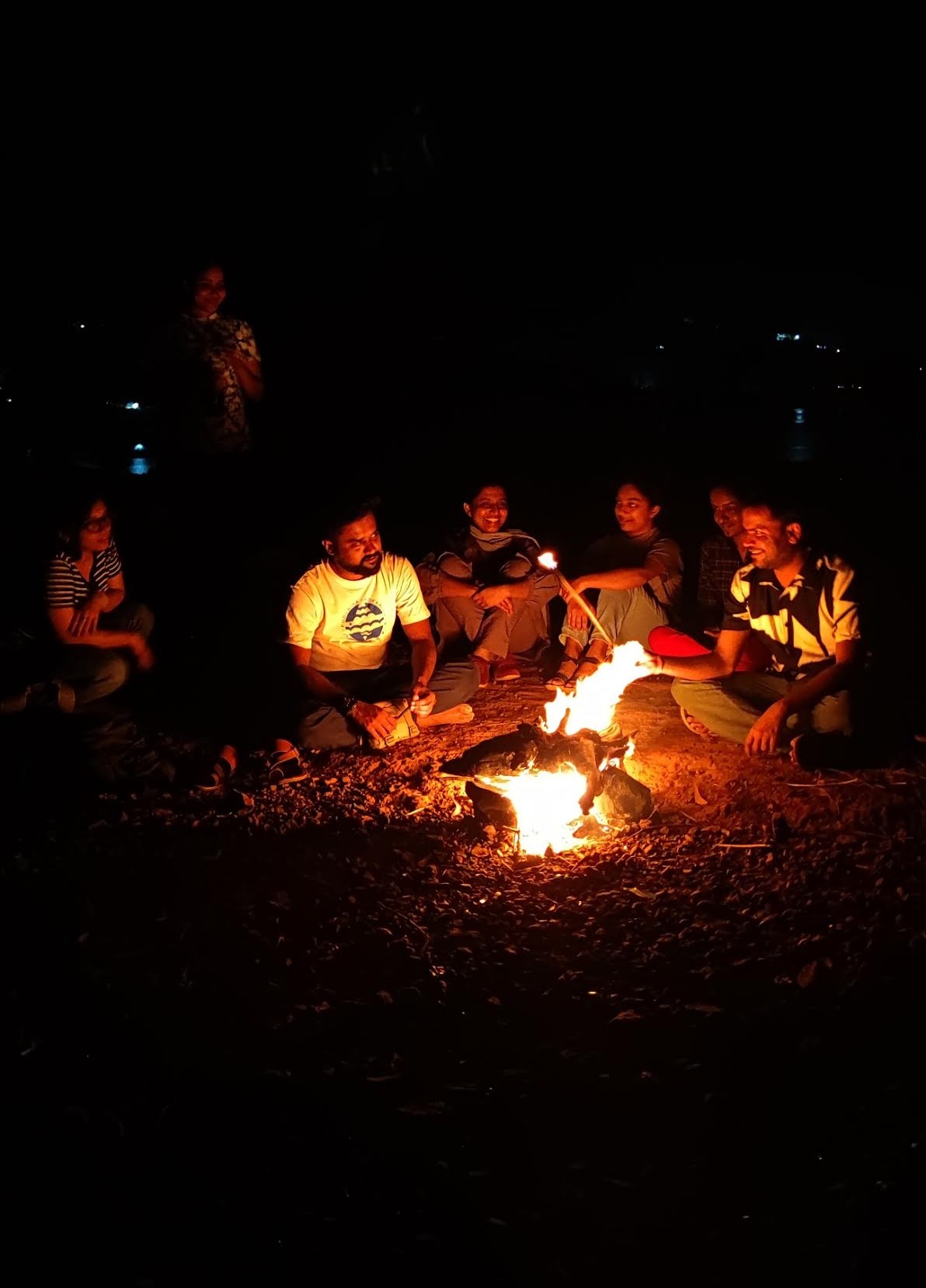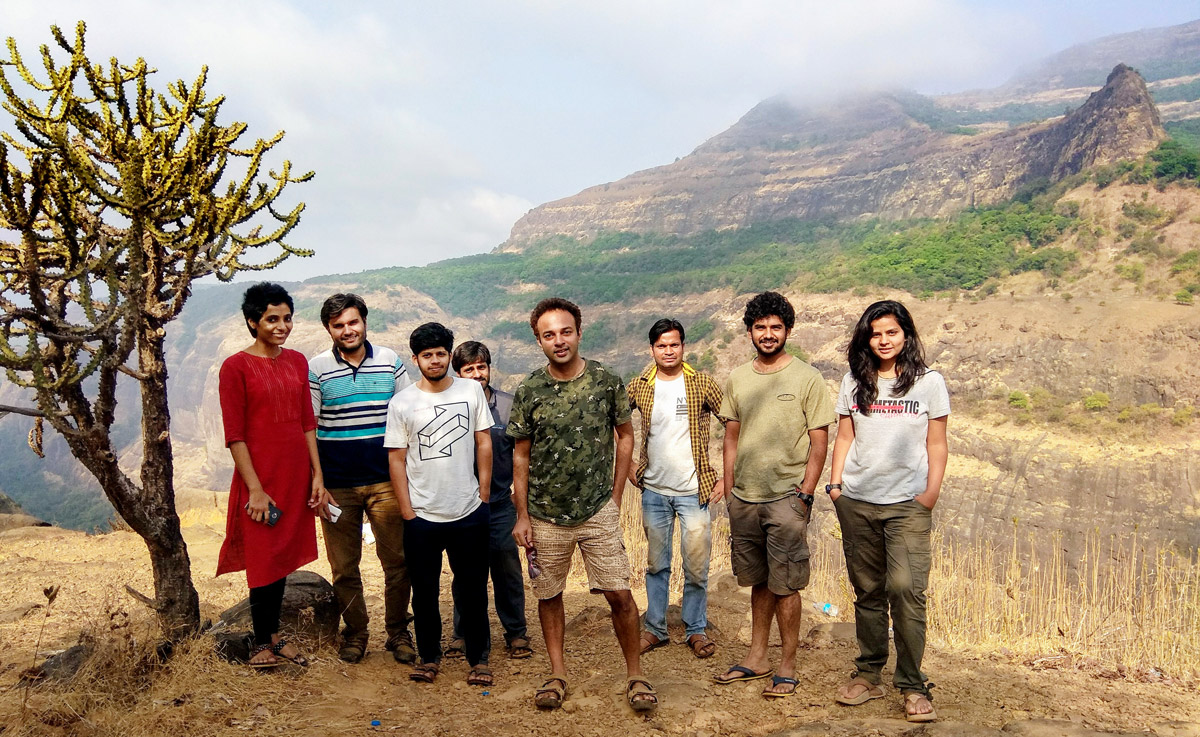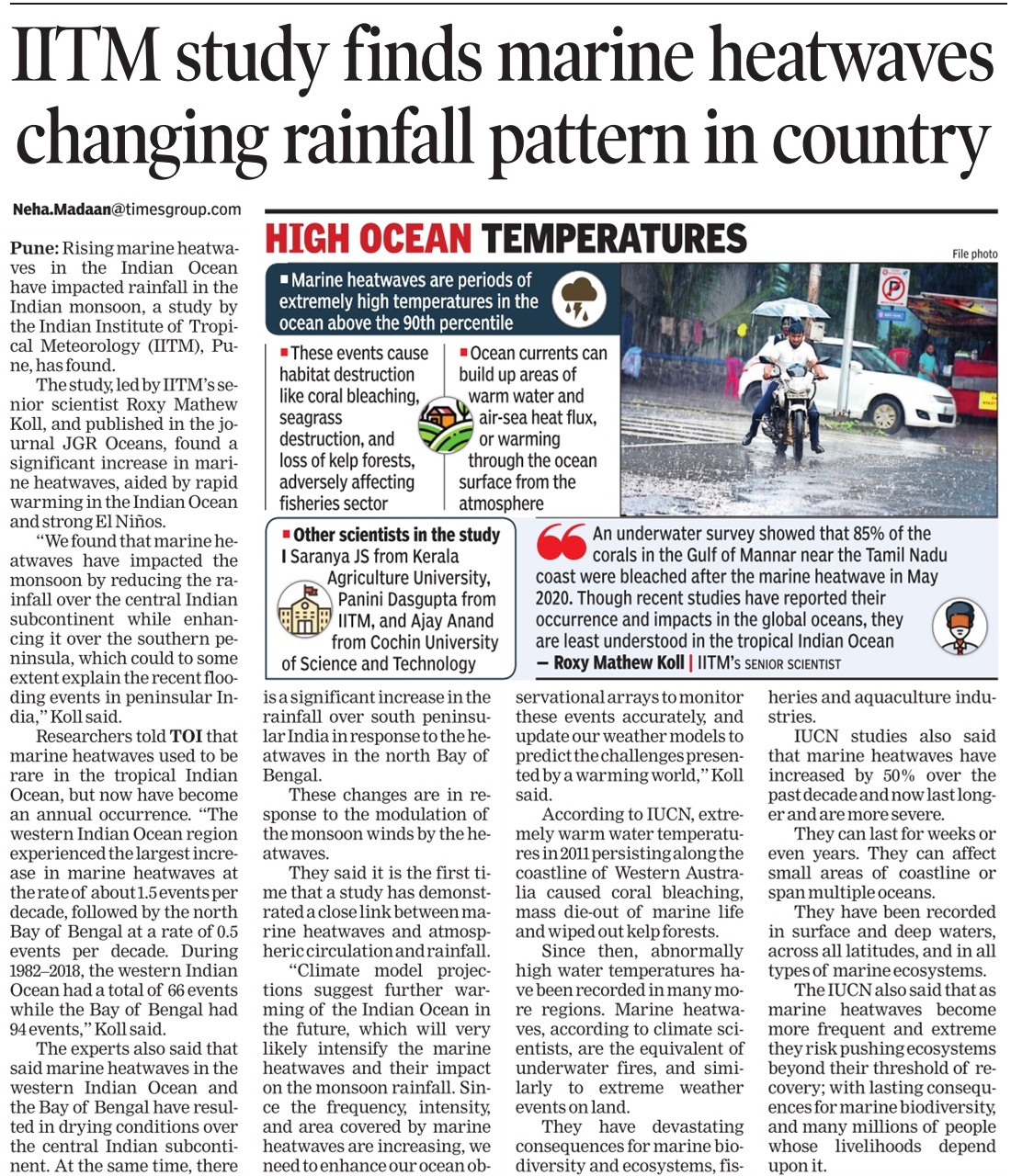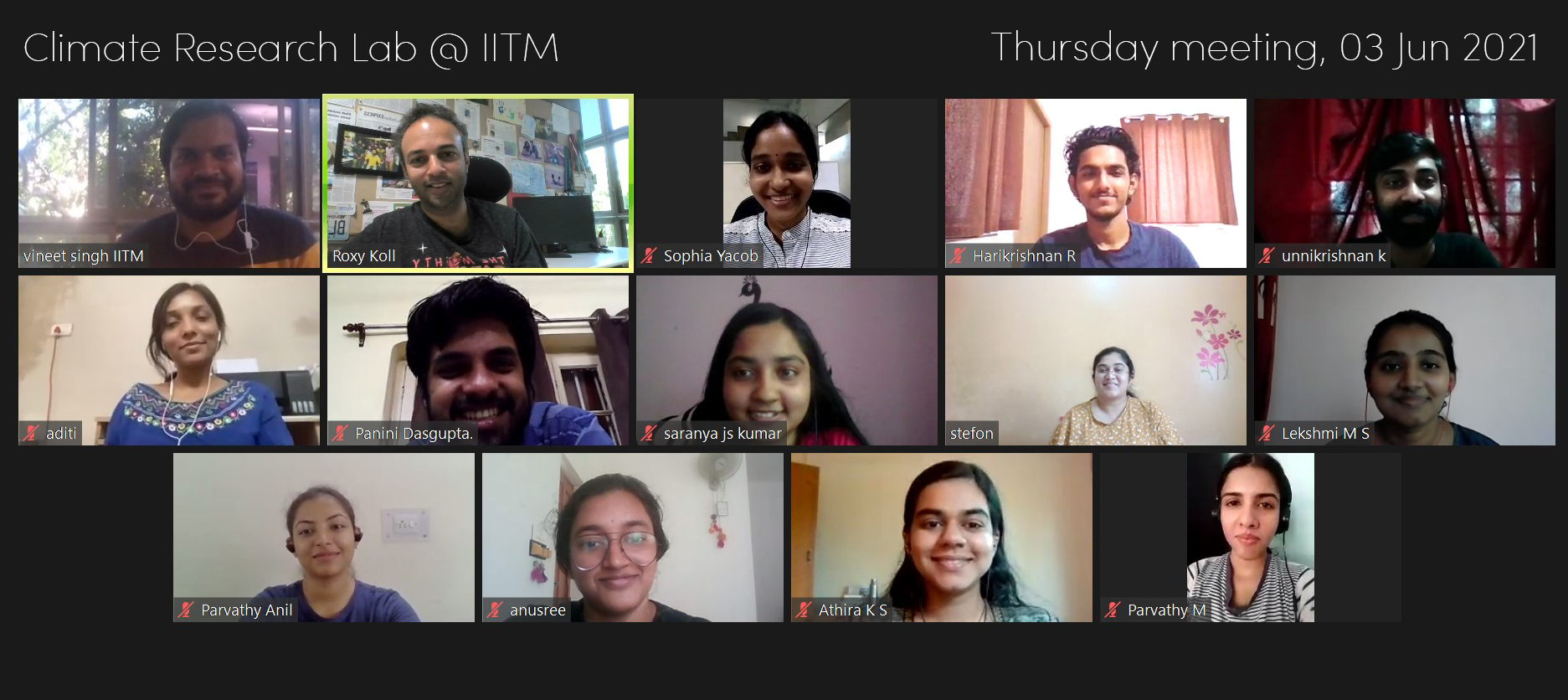We put the ocean in a /shell/ and throw that shell back into the ocean.
At Climate Research Lab we focus on research and development that contributes to the science, monitoring, forecasts, and climate projections for South Asia and the larger Indo-Pacific region. We attempt to translate climate science to facilitate the food, water, and economic security of the region. The lab works on the mechanisms and impacts of climate change on the monsoon, cyclones, heat waves, the marine ecosystem, and human health.
| OSI Award in Climate and Ocean Sciences | |||
| Roxy Mathew Koll received the Prof. R. Ramesh Endowment Award, instituted by the Ocean Society of India, to honor outstanding contributions in climate and ocean sciences.
The award was presented by Goa’s Chief Minister, Pramod Sawant, at the OSICON 25 conference held at the CSIR National Institute of Oceanography (NIO), Goa, on February 5, 2025. | |||
| OSI Award for Best PhD Thesis | |||
| Vineet Kumar Singh received the Prof. A. D. Rao Best PhD Thesis Award in the Oceans and Atmosphere category.
The Ocean Society of India presented the award at the OSICON 25 conference, held at the CSIR National Institute of Oceanography (NIO), Goa, on February 7, 2025. His PhD thesis, titled ‘Understanding the tracks and ocean-atmosphere coupling of tropical cyclones in the north Indian Ocean in a changing climate’, was conducted under the supervision of Roxy Mathew Koll and Medha Deshpande at IITM, Pune. | |||
| Climate Equipped Schools | |||
| The “Climate Equipped Schools” initiative is designed to empower students and communities by integrating weather monitoring, disaster preparedness, and climate change mitigation into the education system. By equipping schools with instruments such as rain gauges, thermometers, and humidity sensors, the program enables students to monitor local weather conditions, fostering a hands-on understanding of climate science. These data are not only used in daily school activities (notice boards, online platforms, etc.) but also shared with local disaster management agencies, enhancing real-time responses to extreme weather events.
Expanding beyond monitoring, the initiative incorporates climate adaptation and mitigation measures for water and energy security. Schools in this framework are equipped with systems for rainwater harvesting or groundwater recharging, and water recycling to address water scarcity and reduce vulnerability to droughts. Solar panels and energy-efficient infrastructure ensure sustainable energy use while reducing carbon footprints. By integrating climate science into the curriculum, fostering community engagement, and addressing critical water and energy needs, “Climate Equipped Schools” positions youth as central agents in combating the impacts of climate change and building a sustainable future.
Roxy Mathew Koll discussed the concept of ‘Climate Equipped Schools’ at the Weather and Youth Conference , organized by the India Meteorological Department, at Prithvi Bhawan, Ministry of Earth Sciences, on 11th January 2025. | |||
| Invite by the President of India | |||
| Roxy Mathew Koll was invited by the President of India Droupadi Murmu, as an Eminent Scientist to the At Home Reception at the Rashtrapati Bhavan, on the occasion of the Republic Day, on 26th January 2025.
| |||
| RockStar Scientist | |||
| The Science Journalists Association of India (SJAI) recognized Dr. Koll’s contributions to science communication and honored him as a Rockstar scientist at the SJAI 2024 conference organized at IISER Pune, on 5 Dec 2024.
| |||
| Monsoon and Climate Change over South Asia | |||
| Is climate change making monsoons more extreme? | The Stream, Al Jazeera. Anelise Borges interviews Roxy Mathew Koll on Monsoon and Climate Change in South Asia, 4 October 2024.
| |||
| Changemakers @ Manorama Conclave 2024 | |||
| Roxy Mathew Koll shared his vision of climate equipped schools and panchayats at the Manorama Conclave 2024 [video]. The Manorama Conclave brought together ‘Changemakers’ from different walks of life. Defence Minister Rajnath Singh inaugurated the event. Union Minister Suresh Gopi was the chief guest at the closing session. Dr. Koll Kerala shared his vision that every school and panchayat in Kerala and India should be climate equipped. “Kerala has schools every 3km. These schools can be climate-equipped. Every school can have a rain gauge and thermometers to measure air temperature. Similarly, schools may run on solar power and also have rain-harvesting/groundwater recharging facilities. That way, students will be not only climate aware but also climate equipped. And their data will be part of the monitoring network.” | |||
| The National Science Award | |||
| The President of India, Droupadi Murmu, presents the first Rashtriya Vigyan Puraskar in Earth Science to Roxy Mathew Koll at the Rashtrapati Bhavan, Delhi, on August 22nd, 2024.
The Rashtriya Vigyan Puraskar is the highest recognition in the field of science, technology and innovation in India. Dr. Koll received the award for his breakthrough contributions to monitoring, modeling, and predicting the Indian Ocean-monsoon climate and extreme weather events. Hindustan Times highlights the Rashtriya Vigyan Puraskar — Vigyan Yuva Shanti Swarup Bhatnagar award [pdf]. The Print interviews Koll on the first National Science Award in the Earth Science category. | |||
| How India can tackle its climate challenges | |||
| As India’s climate landscape evolves rapidly, often outpacing our research and development efforts, it raises critical questions—how has this landscape shifted, and what steps can we take to address the grave challenges that accompany it? Read my Op-Ed in Hindustan Times that tells why “a local early warning mission is as important to the Earth’s future as any space mission” [PDF]. | |||
| The Global Heat Health Information Network | |||
| The Management Committee of the Global Heat Health Information Network (GHHIN), under the United Nations World Meteorological Organization (WMO) and the World Health Organization (WHO), met during July 22–26, 2024 at Singapore.
The Global Heat Health Information Network (GHHIN, we call it gin) is a dynamic community of policymakers, scientists, practitioners, working together for a world where extreme heat is no barrier to lives and livelihoods. The GHHIN contributed to the United Nations Secretary-General’s call for global action on extreme heat, released on July 25th, 2024. | |||
| Future Indian Ocean | |||
| How does the future Indian Ocean look like? The tropical Indian Ocean underwent basin-wide warming during the last 150 years (1871–2020). The warming in the Indian Ocean was strongest during the last seven decades, at a rate of 1.2°C per century. This is dwarfed by the projected warming of 3.8°C per century in the future, if emissions continue at the current rate.
Is ocean warming pushing it into a permanent marine heatwave state? What is the extend of the warming, and what are the potential impacts? In this new article titled ‘Future projections for the tropical Indian Ocean’, we summarize our current understanding of the past and future changes in the physical and biogeochemical state of the Indian Ocean. Read more and download: Future Indian Ocean | |||
| International Indian Ocean Expedition | |||
| If you use weather forecasts, thank the monitoring systems in the ocean and the research and modeling that support these forecasts …and the people behind them!
Recently, we conducted a brainstorming on the Future Road Map for the International Indian Ocean Expedition (IIOE2) at the Indian National Center for Ocean Information Services (INCOIS), Hyderabad. The 2nd International Indian Ocean Expedition is a major global scientific program engaging the international scientific community in collaborative oceanographic and atmospheric research from coastal environments to the deep sea over the period 2015-2025, revealing new information on the Indian Ocean (i.e. its currents, its influence upon the climate, its marine ecosystems) which is fundamental for future sustainable development and expansion of the Indian Ocean’s blue economy. Roxy Mathew Koll is the Co-Chair of the Science Theme on “Extreme events and their impacts on ecosystems and human populations” under the Second International Indian Ocean Expedition (IIOE2). Aditi Modi is the Vice-President of the IIOE2 Early Career Scientists Network. | |||
| Best Poster Award at IISER Frontiers Symposium | |||
| Mareena Mathew received the Best Poster Award at the Frontiers Symposium in Earth, Environmental and Sustainability Sciences 2024 organized by IISER Thiruvananthapuram, for her Masters Thesis entitled ‘Quantifying the Response of Forest Vegetation in India to Changing Climate under Future Socioeconomic and Climate Scenarios’, under the guidance of Dr. Roxy Mathew Koll.
| |||
| Citizen science network for river and rain monitoring | |||
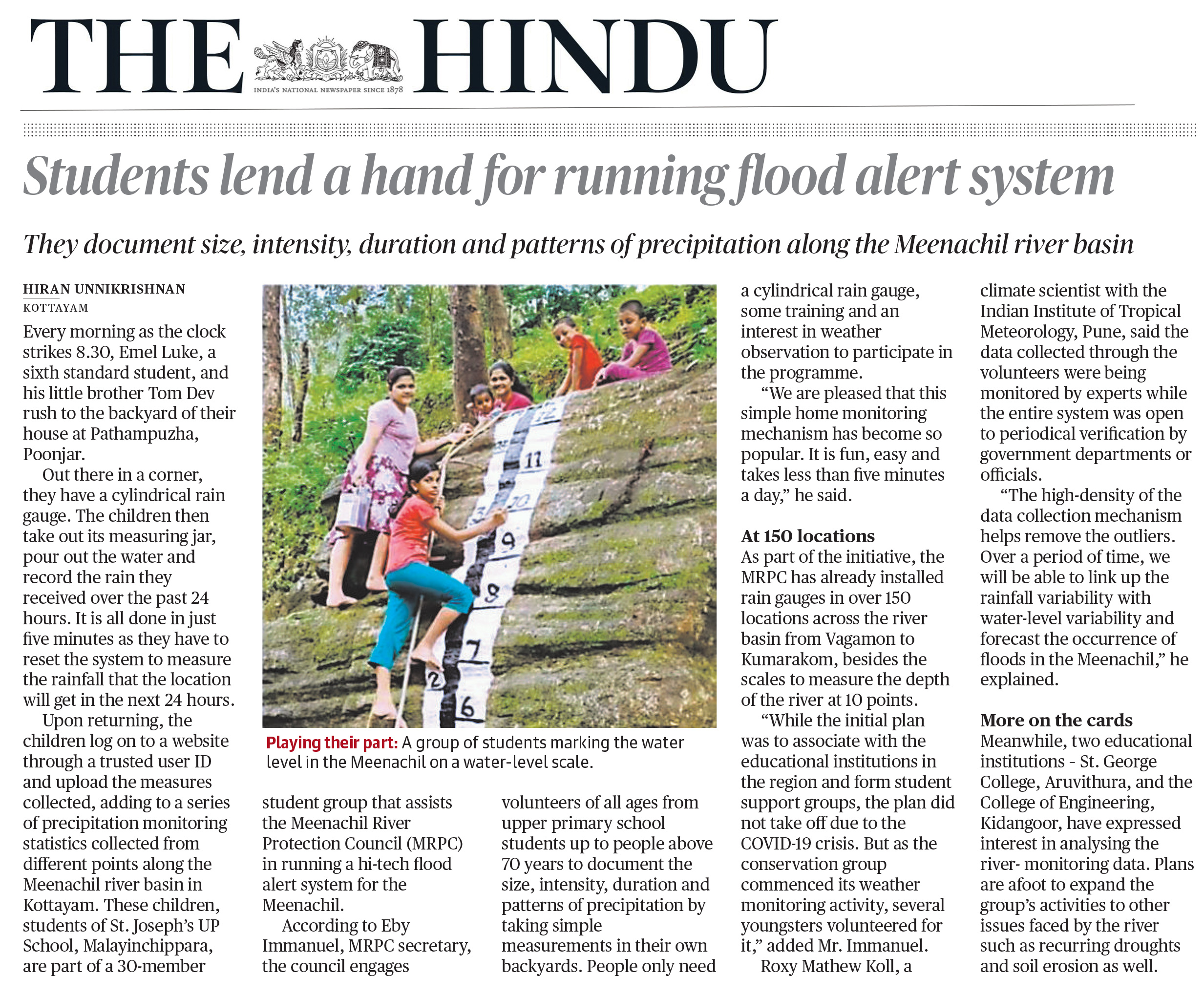 Media highlights on the Meenachil river-rain campaign, a citizen science network, with which Roxy Mathew Koll is involved. Media highlights on the Meenachil river-rain campaign, a citizen science network, with which Roxy Mathew Koll is involved.
| |||
| Student Guidelines | |||
Here are some student guidelines for you to make the best out of our Climate Research Lab. | |||
| Climate Research Lab, 2025 | |||
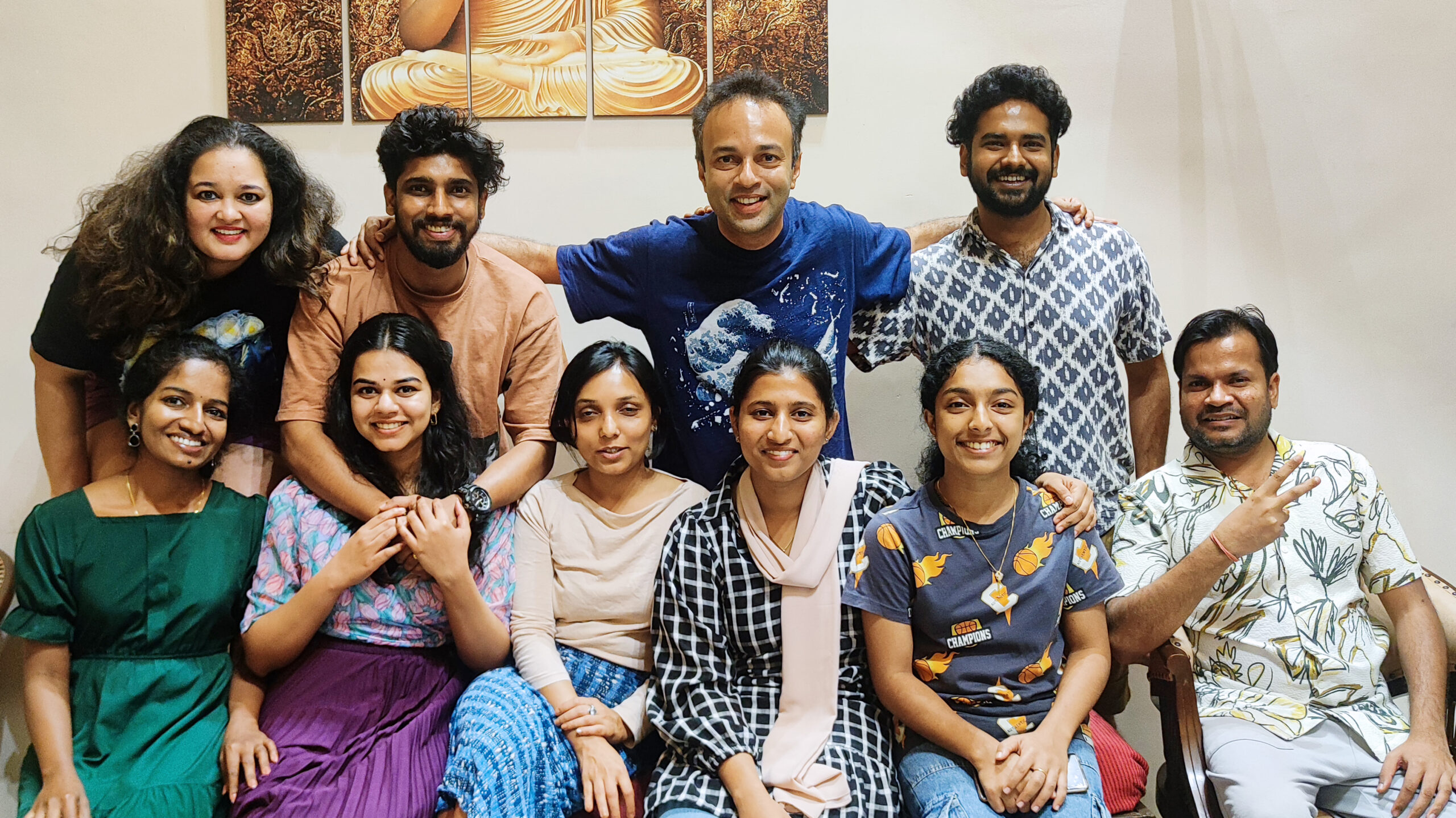
| |||

